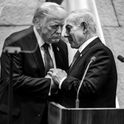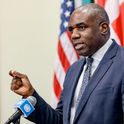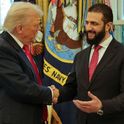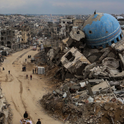Grenades seized by the Israelis last November aboard MV Francop, a container ship on course from Iran to Syria
"Netanyahu thinks he is the superpower,” remarked Bill Clinton bitterly in 1996, “and we are here to do whatever he requires.” Today, as the Americans and the Israelis refuse to budge on the fraught issue of settlements in East Jerusalem, this statement rings truer than ever. US-Israeli relations are at a historic low. But the current standoff is about much more than settlement-building. Underlying it is Washington’s concern that Netanyahu’s repeated gestures of provocation—like the establishment of Jewish heritage sites in the Palestinian territories—are drawing the region towards a conflict unprecedented since 1948. And this time there is a nuclear dimension.
The widely-reported Israeli “insult” to the US—publishing tenders for the construction of apartments in the contested territory of East Jerusalem just as Vice President Joe Biden was in the country announcing peace talks—was considered so audacious that Obama’s tough response has been largely supported, even in overwhelmingly pro-Israel America. The same was the case for Clinton in 1996. This time, however, US-Israeli differences run far deeper. The muffled drums of war have been gathering volume in the middle east for some time, and Obama is seizing the chance to send a clear message: that the US will not be drawn into conflict by the Israelis.
Much has changed as a result of Israel’s near-defeat at the hands of Hezbollah in 2006. Traditionally, the Israel Defence Force (IDF) has enjoyed a mythical status, based on a history of devastating operations such as the surprise attack on the Egyptian air force at the start of the Six Day War of 1967 (the entire fleet was destroyed before they could even leave the ground); the commando incursion into Entebbe in 1976 to rescue the Jewish hostages (Netanyahu's elder brother was the only commando killed in the raid); and the audacious bombing of Saddam's secret nuclear reactors in 1981. Not any more. Filled with renewed confidence, Hezbollah has since been resurfacing the roads near Israel’s border; next time the sabre is rattled, men-at-arms may be transported with far greater ease and efficiency. Israel, in turn, has intensified flights over Lebanese airspace. Ehud Barak, Israel’s defence minister, gave these operations a chilling significance: “we see Hezbollah expanding inside Lebanon and its growing influence, political and otherwise,” he said. “We wish to make clear to the Lebanese leadership that we see everything, and we will hold the parties which cause increased tension responsible.”
Yet such threats ring increasingly hollow. Although Israel attempted to restore the IDF’s battered reputation through the use of awesome force in Gaza in 2009, what these school-bully tactics really indicated was how vulnerable Israel is feeling. The assassination of the Hamas gun-runner in Dubai in January, which made headlines across the world, is another case in point. Every petty shoplifter is aware of the need to avoid CCTV, yet these highly-trained Mossad assassins neglected to avoid the security cameras. Could there be any doubt that a breadcrumb trail was being laid to Jerusalem? Clearly, the Israelis are desperate to gain the upper hand in the propaganda war. They are jittery and starting to overcompensate.
And with good reason. In a development that has far-reaching implications—and is of grave concern to Washington—the middle-eastern powers are beginning to align to a degree never seen before against the Jewish state. In February, the Popular Front for the Liberation of Palestine (PFLP) convened the latest in a series of meetings of all the major players in Palestinian militancy, seeking to reconcile their differences in order to unite against Israel. This has been mirrored throughout the region. Hassan Nasrallah, the leader of Hezbollah, has started to warn, for the first time, of an alliance between Iran, Syria, Hezbollah and Hamas in the event of war.
During talks with his Syrian counterpart Bashar Assad, the Iranian leader Mahmoud Ahmadinejad stated that “we need to put an end to the Zionist regime once and for all.” Emboldened by this, the Syrian Foreign Minister Walid Moallem delivered a stark warning to Israel. “I tell them, stop acting like thugs,” he said. “Do not test the resolve of Syria. You Israelis, you know that war at this time will reach your cities. If such a war breaks out... it will indeed be total war.”
It’s impossible to tell how much of this is bluff. Nonetheless, Israel’s choice of Mahmoud al-Mabhouh for assassination in Dubai indicates that the strengthening of their enemies’ alliances is what most worries them: Al-Mabhouh was responsible for smuggling arms from Iran to Gaza, and as such is symbolic of this new level of cooperation.
When pressing for tougher sanctions against Iran in Febraury, Netanyahu’s logic was revealing. “At least we will know it’s been tried,” he said. In his mind, at least, it appears that military confrontation with Iran is inevitable. He has previously claimed in Moscow that “we are not planning any wars.” Ahmadinejad, on the same day, said Israel is “seeking to start a war next spring or summer.” Obama’s biggest concern is that all of these statements may be right. After all, everyone knows that Israel prefers not to wage war in the winter.
Read Jonathan Power on Obama's foreign policy headache on the Prospect blog
"Netanyahu thinks he is the superpower,” remarked Bill Clinton bitterly in 1996, “and we are here to do whatever he requires.” Today, as the Americans and the Israelis refuse to budge on the fraught issue of settlements in East Jerusalem, this statement rings truer than ever. US-Israeli relations are at a historic low. But the current standoff is about much more than settlement-building. Underlying it is Washington’s concern that Netanyahu’s repeated gestures of provocation—like the establishment of Jewish heritage sites in the Palestinian territories—are drawing the region towards a conflict unprecedented since 1948. And this time there is a nuclear dimension.
The widely-reported Israeli “insult” to the US—publishing tenders for the construction of apartments in the contested territory of East Jerusalem just as Vice President Joe Biden was in the country announcing peace talks—was considered so audacious that Obama’s tough response has been largely supported, even in overwhelmingly pro-Israel America. The same was the case for Clinton in 1996. This time, however, US-Israeli differences run far deeper. The muffled drums of war have been gathering volume in the middle east for some time, and Obama is seizing the chance to send a clear message: that the US will not be drawn into conflict by the Israelis.
Much has changed as a result of Israel’s near-defeat at the hands of Hezbollah in 2006. Traditionally, the Israel Defence Force (IDF) has enjoyed a mythical status, based on a history of devastating operations such as the surprise attack on the Egyptian air force at the start of the Six Day War of 1967 (the entire fleet was destroyed before they could even leave the ground); the commando incursion into Entebbe in 1976 to rescue the Jewish hostages (Netanyahu's elder brother was the only commando killed in the raid); and the audacious bombing of Saddam's secret nuclear reactors in 1981. Not any more. Filled with renewed confidence, Hezbollah has since been resurfacing the roads near Israel’s border; next time the sabre is rattled, men-at-arms may be transported with far greater ease and efficiency. Israel, in turn, has intensified flights over Lebanese airspace. Ehud Barak, Israel’s defence minister, gave these operations a chilling significance: “we see Hezbollah expanding inside Lebanon and its growing influence, political and otherwise,” he said. “We wish to make clear to the Lebanese leadership that we see everything, and we will hold the parties which cause increased tension responsible.”
Yet such threats ring increasingly hollow. Although Israel attempted to restore the IDF’s battered reputation through the use of awesome force in Gaza in 2009, what these school-bully tactics really indicated was how vulnerable Israel is feeling. The assassination of the Hamas gun-runner in Dubai in January, which made headlines across the world, is another case in point. Every petty shoplifter is aware of the need to avoid CCTV, yet these highly-trained Mossad assassins neglected to avoid the security cameras. Could there be any doubt that a breadcrumb trail was being laid to Jerusalem? Clearly, the Israelis are desperate to gain the upper hand in the propaganda war. They are jittery and starting to overcompensate.
And with good reason. In a development that has far-reaching implications—and is of grave concern to Washington—the middle-eastern powers are beginning to align to a degree never seen before against the Jewish state. In February, the Popular Front for the Liberation of Palestine (PFLP) convened the latest in a series of meetings of all the major players in Palestinian militancy, seeking to reconcile their differences in order to unite against Israel. This has been mirrored throughout the region. Hassan Nasrallah, the leader of Hezbollah, has started to warn, for the first time, of an alliance between Iran, Syria, Hezbollah and Hamas in the event of war.
During talks with his Syrian counterpart Bashar Assad, the Iranian leader Mahmoud Ahmadinejad stated that “we need to put an end to the Zionist regime once and for all.” Emboldened by this, the Syrian Foreign Minister Walid Moallem delivered a stark warning to Israel. “I tell them, stop acting like thugs,” he said. “Do not test the resolve of Syria. You Israelis, you know that war at this time will reach your cities. If such a war breaks out... it will indeed be total war.”
It’s impossible to tell how much of this is bluff. Nonetheless, Israel’s choice of Mahmoud al-Mabhouh for assassination in Dubai indicates that the strengthening of their enemies’ alliances is what most worries them: Al-Mabhouh was responsible for smuggling arms from Iran to Gaza, and as such is symbolic of this new level of cooperation.
When pressing for tougher sanctions against Iran in Febraury, Netanyahu’s logic was revealing. “At least we will know it’s been tried,” he said. In his mind, at least, it appears that military confrontation with Iran is inevitable. He has previously claimed in Moscow that “we are not planning any wars.” Ahmadinejad, on the same day, said Israel is “seeking to start a war next spring or summer.” Obama’s biggest concern is that all of these statements may be right. After all, everyone knows that Israel prefers not to wage war in the winter.
Read Jonathan Power on Obama's foreign policy headache on the Prospect blog













